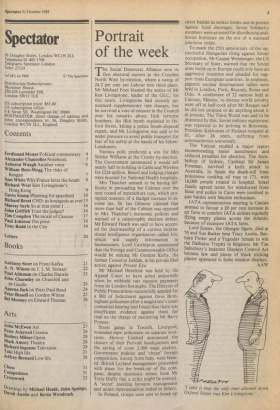Portrait of the week
The Social Democrat Alliance won its first electoral success at the Croydon North West by-election, where a swing of 24.2 per cent put Labour into third place. Mr Michael Foot blamed the antics of Mr Ken Livingstone, leader of the GLC, for this result. Livingstone had recently announced supplementary rate charges, but he survived a vote of censure in the Council over his remarks about Irish terrorist bombers. An IRA bomb exploded in Oxford Street, killing a police bomb-disposal expert, and Mr Livingstone was said to be under pressure to avoid public transport for fear of his safety at the hands of his fellowLondoners.
Various polls predicted a win for Mrs Shirley Williams at the Crosby by-election. The Government announced it would sell nearly half its holding in Cable and Wireless for £224 million. Board and lodging charges were mooted for National Health hospitals.
Mrs Thatcher seemed to be having difficulty in persuading her Cabinet over the next round of expenditure cuts, which prompted rumours of a Budget increase in income tax. Sir Ian Gilmour claimed that more than half of the Cabinet was opposed to Mrs Thatcher's economic policies and warned of a catastrophic election defeat. Mr Edward Heath was said to have accepted the chairmanship of a curious international intelligence organisation called Iris, which will supply information to businessmen. Lord Carrington announced that the Foreign and Commonwealth Office would be staking Mr Gordon Kirby, the former Consul at Jeddah, in his private libel action against Private Eye.
Mr Michael Heseltine was held by the Appeal Court to have acted unlawfully when he withheld rate support payments from six London boroughs. The Director of Public Prosecutions successfully applied for a Bill of Indictment against three Birmingham policemen after a magistrate's court committal hearing had found that there was insufficient evidence against them for trial on the charge of murdering Mr Barry Prosser.
Street gangs in Toxteth, Liverpool, wounded eight policemen on separate occasions. Hoover Limited announced the closure of their Perivale headquarters and the saving of some 2,000 wage packets. Government policies and 'cheap' foreign competition, mostly from Italy, were blamed. British Leyland management proceeded with plans for the break-up of the company, despite optimistic noises from Mr Terry Duffy that a strike might be averted. A 'secret' meeting between management and union representatives ended in failure. In Poland, troops were sent to break up street battles as strikes broke out in protest against food shortages. Seven Solidarity members were arrested for distributing antiSoviet literature on the eve of a national one-hour strike.
To mark the 25th anniversary of the unsuccessful Hungarian rising against Soviet occupation, Mr Caspar Weinberger, the US Secretary of State, warned that the Soviet arms build-up in Europe could only have an aggressive intention and pleaded for support from European countries. In response, gigantic nuclear disarmament rallies were held in London, Paris, Brussels, Rome and Oslo. A conference of 22 nations held at Cancun, Mexico, to discuss world poverty went off at half-cock after Mr Reagan said he did not propose to do anything about it at present. The Third World was said to be dismayed by this. Soviet military equipment was reported to be arriving in Botswana. President Kekkonen of Finland resigned at 81, after 26 years, suffering from arteriosclerosis universalis.
The Vatican studied a major report recommending easier annulments and reduced penalties for abortion. The Archbishop of Sydney, Cardinal Sir James Freeman, survived a knife attack in Australia. In Spain the death-toll from Poisonous cooking oil rose to 171, with 16,000 people treated in hospital. Israel finally agreed terms for withdrawal from Sinai and police in Cairo were involved in gun battles with Muslim enthusiasts.
IATA representatives meeting in Cannes seemed to favour a 20 per cent increase in air fares to comfort IATA airlines regularly flying empty planes across the Atlantic because of excessive IATA fares.
Lord Exeter, the Olympic figure, died at 76 and Sue Barker beat Tracy Austin, Barbara Potter and a Yugoslav female to win the Daihatsu Trophy in Brighton. Mr Tim Sainsbury's Indecent Displays Control Act became law and pieces of black sticking plaster appeared in Soho window displays.
AAW






































 Previous page
Previous page